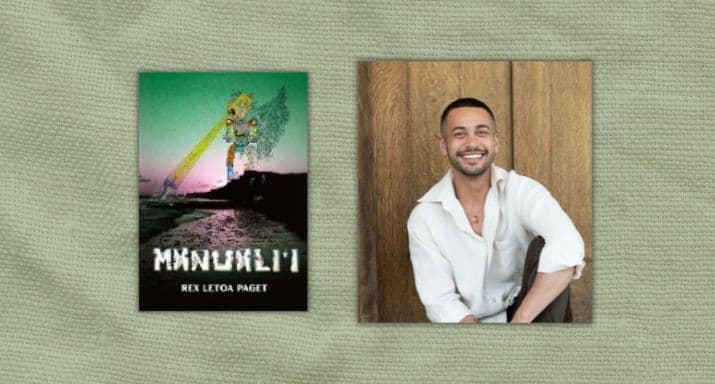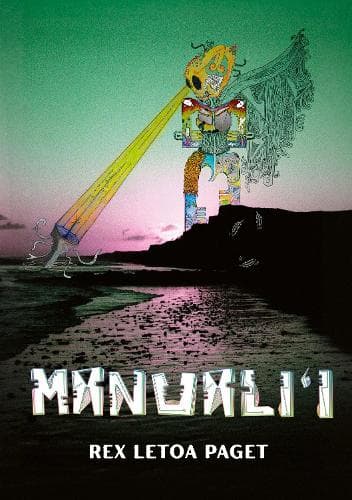Interview: Rex Letoa Paget, author of Manuali’i

Manuali'i - Bird of the Gods - is an anchor to ancestors and to self. These poems are reminders of who you come from and who you are; compasses to constant new becomings. Questions for timekeepers and connections to universal powers. Being guided by messengers of the sky. Dancing on the delicate tightrope of here, the past, and an imagined future, Manuali'i dives into the heart of grief and loss and love; wraps a tongue around the soft grooves of Samoan words; and rides off into the distance on a Triumph Bonneville. In this dreamy debut, Rex Paget will have you reminiscing on past loves; dancing in the rain; and appreciating the depth and range of human emotion and connection.
We spoke to Rex about the genesis and journey to write this collection, how writing can be a way of finding truth, and how he found the title Manuali’i.
Hi, Rex. This is very exciting, to hear from you! Tell us about how your collection came to be?
I started writing the title poem 'Manuali’i' a few years ago. With that poem I really wanted to explore connection. It was born of a documentary I watched where a herd of elephants were being led to a river by their Matriarch. She knew the way because her mum showed her, and before that her grandmother had shown her mum. When they got to the river, after travelling thousands of kilometres, it was dry. Except there were trees growing so they knew there was water still. The herd tried to reach for the leaves but were too small to grab anything. The Matriarch saw a bull elephant who was feeding on the leaves and she knew him from a long standing family connection. So she went over and he ended up pulling branches and leaves down for her so her herd could eat. I remember seeing this and thinking, what if we all knew the ancestral way like that? What if that was never taken from us? How different would the world look? How different would we be?
I think for so much of my life I’ve struggled to make sense of a purpose. Why was I given this body and this life? So I started going back to my roots. Reconnecting with family, curious about how we came to be. And life happened in between, heartbreak happened, death happened, growth happened. I was collecting all these moments of love, loss, and everything in between. As I journeyed through loss I started to think more about what does connection mean within the death of a relationship, of a person, and of a past self? What are all the things that add up to a life? Manuali’i as a collection is my journey through. With the knowing that the journey can’t be in isolation and is always continuing.
Chris Tse has said that your ‘crystalline imagery cuts through a transcendent haze of ‘ancient smoke’, which is a great image in itself. Did you set out to slice up the ‘ancient smoke’, and how do you feel this works within your collection?
I feel Manuali’i was written in guidance and conversations with my ancestors. Through the time I was writing I would give daily praise to the ancients, the ancestors and the guides I felt they were sending my way. When I was wayfinding myself and trying to make sense of things around me, there was always a belief in something bigger happening in the background pulling me through. I know that feeling as my Nana’s having my back. I felt they were grounding and propelling me to write stories about what was guiding me and exploring what those connections are, what they mean to me, and what I learned from them. As well as gifting me the tools I needed to understand what I am connected to. Manuali’i as a foundation is faith in things we can’t quite touch or see but trusting your own knowing of what they are. The journey was trying to understand what they meant to me and keeping them grounded in the here and now.
How did the themes across your collection develop, and was it always your\ intention to cover a lot of different subjects?
I’ve always loved telling stories and the act of storytelling as a way of finding truth. When I first started to write Manuali’i, I was writing about how I experience the world. Through the lens of someone who grew up feeling disconnected to culture, who felt a lot of shame for that, and who is fa’afatama. How those experiences of the world shaped me in terms of identity, family, friends, and connection to the world around me.
I feel the journey of Manuali’i opened me up in a way I hadn’t been before on the page. In a more vulnerable way of letting people into my world. I don’t think I intended to cover a lot of subjects, I think I was just trying to make sense and balance all of the things that were happening for me at that time. Knowing there’s always a root that’s deeper than what we see, and I like to dig that up and inspect whatever that might be.
Manuali’i - Bird of the Gods’ is a fascinating title, and concept. Can you tell us more about what it means?
Manuali’i was born out of a conversation with my mum. When I was moving through this loss, and especially feeling unrooted from myself, I went back to my roots. I was asking questions about family and where and who we come from. My mum was telling me the real names of my Aunties and Uncles before they came over to Aotearoa. When they got here the school system couldn’t pronounce their names properly so they changed them to english names. One of my uncles, his real name is Manuali’i, and I just thought that was the most beautiful name I’d ever heard. I felt like it really encompassed the journey of Manuali’i, as something that was wayfinding, feeling connected to something bigger, and receiving/believing in signs from ancestors or the universe. The space I was moving through at the time, like anyone going through grief, I was doing a lot of bargaining with the universe, and a lot of praying in a way - to a person and to my ancestors. I just felt like Manuali’i, not only gave praise to my family, but encompassed this massive journey I was on. It gave perspective and gratitude to what we can feel but cannot see. To messengers of the sky.
Rex has kindly given Kete permission to publish the poem EVERYTHING IS EVERYTHING from Manuali’i.
EVERYTHING IS EVERYTHING
after Ms. Lauryn Hill
to know your sweetness is to know where you lay and feed the trees.
where you recognise handprints embossed in molten rock by first frosts.
where you become witching hour stories told around plastic tables on moss-covered patios
and stardust glistening the nose of your wildest dreams.
to know your sweetness is to know the structure of your bones.
cheeks cut from atlantic fjords and nurseries of nana Nielsine’s grit.
fighting fires in pit-sawn huts
hid her eleven children and husband down a well while pregnant with her twelfth.
eyes carved from first-blast uranium and your father’s love of the chase.
crooked-eared coasts of your greats
who sawed rings for their hands
tinkerers of forests and sands
fine ground rushing thru hourglasses.
time kept close-fisted behind their backs.
sifting through secrets stashed in cul de sacs
dead named facts.
what lies beneath what they don’t teach is
fungi forest fabric marbled with fine pandanus linens
covering bellies of rebellion mothers
where you were dreamed of.
you.
secret seer
moon believer
shadow greeter.
paved the road from your front door with a 6 to 1 mix of
curiosity and nerve.
bit fear til you could see your fingertips
found clues nana Heather left you on postcards and backs of
photographs.
notice your hands in
seamstresses
weavers
painters
teachers.
weaving past and future through bows of your bind
til you can sit present
anchored
in the gravity of time.
crossed-legged with mum as she teaches you how to plait
grass.
twist life into a high-waisted season
acid wash
flared denim
belt looped over
silk-webbed patchwork stitched beneath skin
since before wind whispered into mountain.
paint your dad’s bedroom galactic black.
fish for stars of his youth.
singing on the back of his ‘61 thunderbird
vinyl planets spinning 45 rounds per minute
god save the queen
the fascist regime
they made you a moron
a potential h-bomb
malcolm mclaren meets johnny rotten
spitting seeds of his adam’s apple
not far from trees in his backyard
you pull weeds off
freeing your breath in unison.
you.
made of
mangrove forests
lightning-scarred winds
high tides polishing rocks in the sky.
familiar pull of belly button
waking you in the middle of the night.
following fleets of hawks til you can smell home.
burnt pine and damp forest floor on an open fire.
charcoal eyes send smoke signals to curses
brass-knuckled between your fingers.
each one a dark-alley bruise on ripe flesh.
slugging it out in hand-me-down sweaters.
picking apart the yarn of truth when it lays you flat.
realising you aren’t all of your ancestors’ wildest dreams.
for some. you’re probably their worst nightmare.
breaking fingers that curl around empty forks on hungry east coast roads.
rewiring the matrix in your brain.
drowning your given name.
your veins do not lay in vain.
lifetimes from now
when your grandmothers begin to cloak themselves in leaves
their favourite colours
new hands will search the vine to find you.
they will dig through dust gathered at seams of forgotten
salvation pockets.
pickaxe pixels from a capsule of memories planted in fields
named after your children.
catch your lessons on the bridge of their nose
you cross to come home.
Rex Letoa Paget (Samoan/Danish) is a fa'afatama crafter of words born in Aotearoa, now living on the unceded lands of the Wurundjeri people. His poetry and storytelling are his compass through space and time. His works are giftings from his ancestors and have been published in Tupuranga, Te Tangi A Te Ruru, AUNTIES, Overcom, No Other Place to Stand: An Anthology of Climate Change Poetry from Aotearoa New Zealand, Rapture: An Anthology of Performance Poetry from Aotearoa New Zealand, Spoiled Fruit: Queer Poetry from Aotearoa, and Australian Poetry Anthology Vol 10. His offerings are lessons, learnings, and acknowledgments for the timelines and traditions of yesterday, today and tomorrow.
